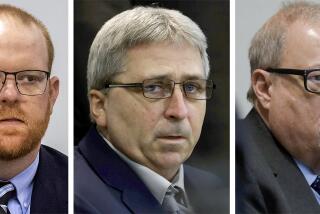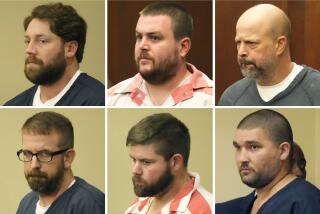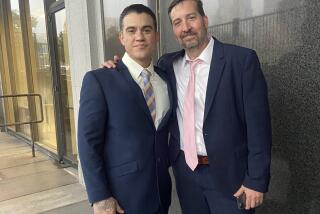‘West Memphis Three’ freed in ’93 slayings
The men known as the “West Memphis Three,” who served more than 18 years behind bars for the notorious 1993 murders of three young boys — and became a cause celebre among actors and musicians who doubted their guilt — won their freedom in an Arkansas courtroom Friday after new evidence arose to potentially challenge their convictions.
Their legal absolution, however, was not clear-cut. In an agreement with prosecutors, Damien Echols and Jessie Misskelley, both 36, and Jason Baldwin, 34, pleaded guilty to first-degree murder charges but will also able to claim they are innocent, a rare arrangement known as an Alford plea.
“It’s not perfect by any means,” Echols, pale and in tinted shades, said at a news conference after the hearing. “But at least it brings closure.... We can still try to clear our names. The only difference is now we can do it from the outside.”
Echols, the alleged ringleader, had been on death row. Baldwin and Misskelley were serving life sentences.
The gruesome slayings of the 8-year-old boys — Christopher Byers, Steve Branch and Michael Moore — terrified the small city of West Memphis, Ark., leading to rumors that a Satanic cult was responsible. After disappearing one afternoon in May 1993, the second-graders were found “naked, bound and in horrific condition, submerged in a creek in the woods,” according to a court filing.
Later, the convicts’ plight became an enduring issue among musicians and Hollywood actors who were concerned that the suspects, teenagers at the time, were persecuted for being different. Their black clothing and preference for heavy metal music had been presented by prosecutors as part of an argument that they were Satanists who had engaged in “an occult murder.”
Singers Natalie Maines of the Dixie Chicks and Eddie Vedder of Pearl Jam, who had publicly called for a new trial, attended Friday’s court hearing.
Scott Ellington, the prosecuting attorney in Jonesboro, Ark., said that with new revelations in the case, it was likely the men would have received new trials — and that it would have been “practically impossible” to put on a proper trial 18 years after the slayings. He noted that two of the victims’ families had also decided over time that the men were wrongly accused.
After the slayings, West Memphis police interviewed Misskelley, who told them he watched as Baldwin, then 16, and Echols, then 19, killed the boys. One detective said Misskelley had also talked about being in a cult.
The three were convicted in 1994 but have been behind bars since their arrests shortly after the killings.
Supporters said Misskelley’s confession was false and coerced, and have noted that he’s mentally disabled. Misskelley later recanted the confession.
More recently, attorneys for the men raised other issues that would have likely been brought up in fresh trials. The Arkansas Supreme Court found that none of the recent DNA testing of material at the crime scene pointed to the convicted men. (There had been no such testing at the time of the trial.) The high court had ordered new hearings scheduled for December.
Attorneys for Echols, in a February filing, said that DNA testing of a hair on a cord used to bind one of the victims was consistent with the DNA of Terry Hobbs, the stepfather of victim Steven Branch.
Hobbs has denied seeing the three victims on the day of their disappearance, but Echols’ attorneys said they had found three eyewitnesses who said Hobbs was “the last adult seen with the victims” on the night they disappeared.
Hobbs told a local TV station that he had “done nothing wrong.” The Times was unsuccessful in contacting him Friday.
Ellington, the prosecutor, said that Hobbs was not a suspect and that he considered the case closed.
“As far as the state’s concerned ... there is no further investigation,” he said in a phone interview, adding that he would consider compelling new information if it surfaced.
An Alford plea is so called because it derives from the 1970 Supreme Court case Alford vs. North Carolina, in which the court ruled that a valid guilty plea does not necessarily require admitting guilt. It is sometimes agreed upon when both defense and the prosecution have reasons for wishing to avoid a jury trial.
Judge David Laser had surprised followers of the case Thursday in scheduling the hearing. On Friday, celebrity supporters said they were shocked and relieved by the fast-moving turn of events.
James Hetfield of Metallica, interviewed by phone from Hawaii, called the outcome “amazing.” He said the band became interested in the case — and agreed to let their music be used in an HBO documentary — because it seemed like a case of “judging the book by its cover.”
“The way you dress, the things you listen to ... I can basically speak for myself, growing up, that that was just a sign of wanting to be creative and be different,” he said.
More to Read
Start your day right
Sign up for Essential California for news, features and recommendations from the L.A. Times and beyond in your inbox six days a week.
You may occasionally receive promotional content from the Los Angeles Times.






